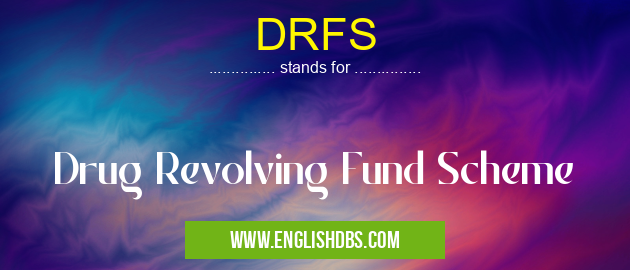What does DRFS mean in DRUGS
Drug Revolving Fund Scheme (DRFS) is a project initiated in India to provide essential drugs and equipment to public health centres free of cost. The scheme also includes the provision of medicines for out-patients at minimal rates. This is a flagship project of the National Health Mission (NHM) of the Government of India and has been rolled out in several Indian states. The objective behind launching this scheme is to make quality healthcare accessible and affordable to all citizens, even in remote areas. DRFS works by enabling Public Health Centres (PHC) to store drugs for distribution to patients who may not otherwise be able to afford them. It also aims at ensuring good clinical outcomes by providing access to quality medicines in a timely manner and facilitating appropriate diagnosis and treatment for even those living in rural areas with limited resources.

DRFS meaning in Drugs in Medical
DRFS mostly used in an acronym Drugs in Category Medical that means Drug Revolving Fund Scheme
Shorthand: DRFS,
Full Form: Drug Revolving Fund Scheme
For more information of "Drug Revolving Fund Scheme", see the section below.
What does DRFS Stand For?
DRFS stands for Drug Revolving Fund Scheme, a government-funded initiative aimed at providing essential medicines and equipment for free or at very low costs, especially in rural areas. DRFS is managed by the National Health Mission (NHM) under the Ministry of Health & Family Welfare, Government of India. The scheme covers both outpatient drugs and equipment which are made available in PHCs across India as per specific guidelines stipulated by state governments.
How Does DRFS Work?
The Drug Revolving Fund Scheme works on a simple concept – PHCs order drugs from approved vendors approved which are then stored at their dispensary or pharmacy, depending on local regulations. Patients can then obtain these drugs either free or at minimal rates if they are unable to afford them otherwise. All revenue generated through sale of medicine goes back into the revolving fund, so that new stocks can be purchased whenever needed without having to wait till funds are released by central or state governments. All transactions are monitored closely so as to ensure that there is no misuse of funds.
Benefits Of DRFS
The Drug Revolving Fund Scheme provides immense benefits for those living in remote regions where accessing quality healthcare can often be difficult due to financial constraints as well as other factors such as distance from medical facilities or lack of awareness about medical services available. By providing access to quality medicine at an affordable price, the scheme not only ensures that appropriate treatment is provided but also reduces incidence of complications arising due to inadequate therapy or delayed diagnosis due to financial reasons.
Essential Questions and Answers on Drug Revolving Fund Scheme in "MEDICAL»DRUGS"
What is a Drug Revolving Fund Scheme?
The Drug Revolving Fund Scheme (DRFS) is a public health initiative designed to provide access to essential drugs at an affordable price in developing countries. It is funded by the Government and managed by local Non-Governmental Organizations (NGOs), collaborations between public and private sectors, or other organizations.
What is the purpose of DRFS?
The primary purpose of DRFS is to ensure equitable access to quality, safe, and effective essential medicines for those who need them most. This includes providing aid to vulnerable populations such as pregnant women, children, elderly people, and other individuals who may not be able to afford the cost of treatment. It also aims to support health systems and promote self-reliance by encouraging the rational use of essential medicines.
How does DRFS work?
In general, local NGOs or other organizations that are responsible for managing DRFS establish drug revolving funds which are used to purchase various essential medicines from pharmaceutical suppliers. These funds are usually sourced from donors such as governments or private foundations. Local pharmacies then stock and sell these drugs at discount prices so that they can be accessed by individuals who need them most.
Who administers DRFS?
DRFS is typically administered by local NGOs or other organizations that collaborate with government agencies and the private sector to procure drugs at low prices for sale through registered pharmacies in their target areas. This helps ensure equitable access to affordable essential medicines for all members of society regardless of their economic status.
Where can I find out if my nearest pharmacy participates in DRFS?
You can contact your nearest pharmacy directly and ask if they participate in DRFS or you can visit the relevant government agency’s website which will have information about all participating pharmacies in their jurisdiction. Alternatively, you can contact any local NGO or charity organization that deals with healthcare issues and inquire about any participating pharmacies in your area.
Who qualifies for Pharmaceutical benefits under DRFS?
: Qualifying conditions vary depending on the individual policy guidelines set by each country’s respective agencies; generally speaking however patients suffering from chronic illnesses such as HIV/AIDS, cancer, diabetes, etc., pregnant women and nursing mothers qualify for pharmaceutical benefits under DRFS
Final Words:
The Drug Revolving Fund Scheme has been launched with an aim of reaching out towards all those living in rural regions who do not have access to proper healthcare services due either lack of resources or awareness about such services available near them. It provides much needed respite from long waiting times coupled with high costs for medications thereby reducing burden on individuals suffering from chronic illnesses or other ailments requiring regular medication but unable affording them financially.
